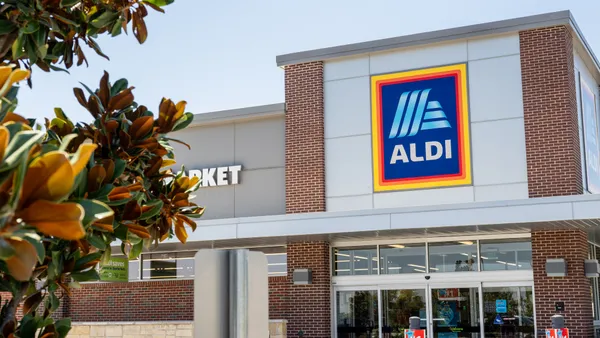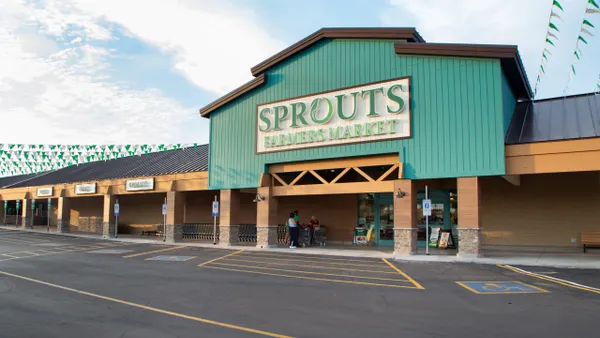Dive Brief:
- North Carolina-based Lowes Foods has opened speakeasy-themed liquor stores next to two of its stores in Columbia, South Carolina, according to The State. The first location opened last month in Lexington and the soft opening for its second location in Forest Acres was last week.
- The liquor store, called Knock Knock, is located adjacent to the Lowes stores and has a separate entrance and address as required by state law. Both store spaces were formerly shopping cart corrals.
- Knock Knock's shelves are stocked with name brand as well as local liquors from Columbia’s Crouch Distilling, Gorget Distilling Co. in Lugoff and Firefly Distillery in Charleston. In addition, it has a small selection of high-price liquors like the Hennessy Paradis cognac which retails for $1,259 per bottle at its Forest Acres store.
Dive Insight:
A speakeasy-themed liquor store comes naturally for a grocer where employees break out into chicken dances, and where a "sausage professor" oversees its Sausageworks department.
Knock Knock is modeled after a Prohibition-era speakeasy, complete with throwback font on its promotional materials and employees wearing fedoras and black-and-white striped aprons. The locations are very small, with bottles stacked high and accessible by a sliding ladder. "Our store is the cat's meow," Lowes' notes on the newly created Knock Knock website.
In a statement emailed to Grocery Dive, Charles Slezak, Lowes' Foods director of beverage, said Knock Knock builds on the success of its in-store bar concept — called The Beer Den — which began rolling out to stores after North Carolina passed a law in 2015 allowing growler pours and bottle sales at grocery stores.
“We’ve done so much with beverages, such as Lowes Foods’ iconic Beer Dens, that we thought Knock Knock was the next logical step — particularly with our growing number of stores in South Carolina where the laws allow private liquor store sales,” Slezak said.
If Knock Knock proves successful for Lowes, it could expand to its 14 South Carolina stores. But it couldn't extend to North Carolina, where most of its stores are located, because in that state all liquor stores have to be owned by the state government.
Alcoholic beverage sales in the U.S. have increased by almost 30% since 2011, mostly led by the demand for spirits and wine versus beer. Spirits' market share grew by 10% in the past decade and has averaged a 13% sales growth each year, according to figures compiled by Statista.









